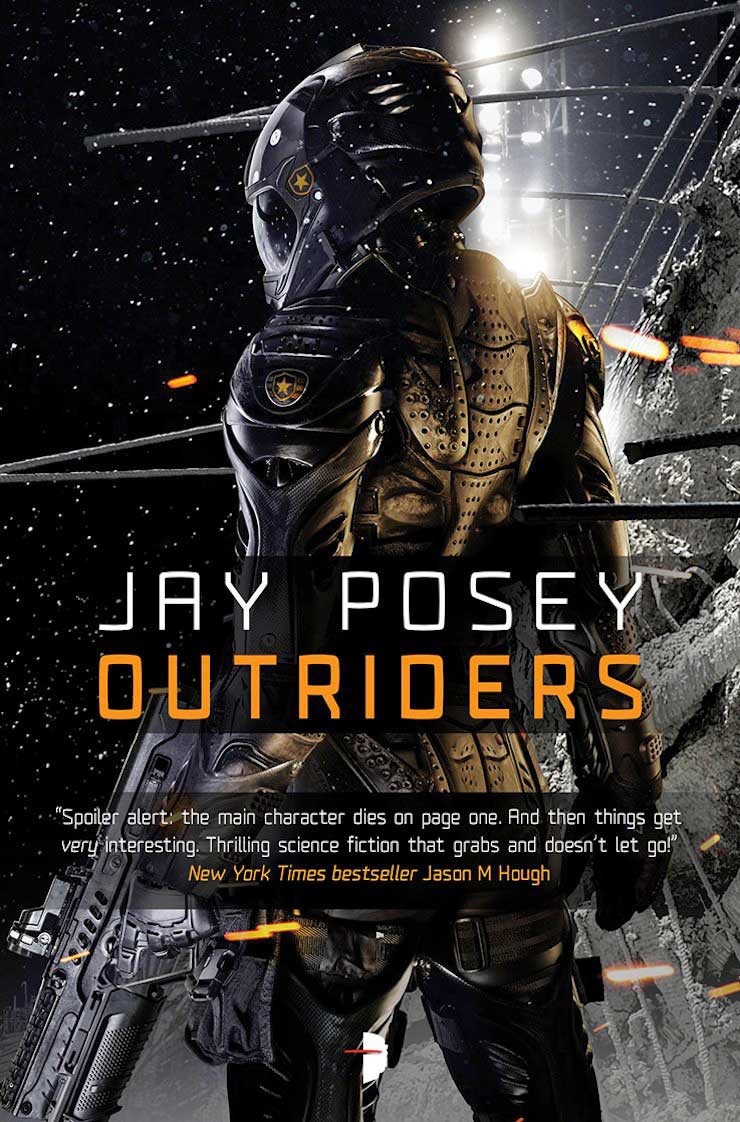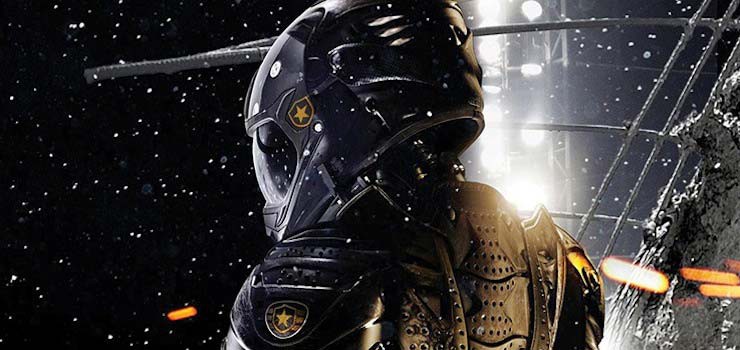We’re pleased to share the cover for Outriders, the start of a new Military SF series from Jay Posey—available May 3rd in the US/Canada and May 5th in the UK and worldwide from Angry Robot Books. Learn more about the novel below and check out the full cover by artist Larry Rostant.
Author Jay Posey also shares his thoughts on the writing process for Outriders, and how it differs from his previous Legends of the Duskwalker series.
From the catalog copy:
A daring hostage rescue leads to the discovery of an imminent terrorist attack. Thanks to the Outriders, thousands of lives are saved. Until they aren’t.
Despite the intelligence and the warnings provided by the unit, the terrorist attack goes off unhindered. What was supposed to be a triumph becomes a tragedy, and a “mission completed” completely unravels. And when they learn the reasons why, the Outriders find themselves tasked with stopping a war before it can ever start. A dangerously cunning woman who most assuredly should be dead has seemingly returned. And her plans aren’t just devastating, they might be unstoppable.
How do you defeat a hidden enemy when you can’t let them know they’ve been discovered?
You send in the Outriders.

Starting a new thing is always exciting, especially in a sort of what-am-I-doing, why-did-I-ever-think-this-was-a-good-idea terrifying kind of way.
Outriders is my fourth novel, and I foolishly thought that certainly by now, now that I had written a whole trilogy, I knew enough about this writing novels thing to be able to Write Confidently and Boldly. It’s funny (sad) how often I have to relearn lessons I was sure I’d learned before. (As a quick aside, if you ever hear me say “But this book will be different …”, feel free to nod and smile and remind me that yes, it will be different, but only in the sense that it will be difficult in some new way I hadn’t thought of or experienced yet.)
So Outriders is a New Thing for me. It’s the start of a new series, set in a new world, new characters, new direction. And that means leaving old things behind.
My first trilogy, the Legends of the Duskwalker cycle (also from Angry Robot), was set in what I half-jokingly call a high-tech, post-post-apocalyptic world; bad things happened there, but they happened long ago enough that most people in that world don’t bother with The Way Things Used to Be anymore. Especially since they have to work so hard to deal with The Way Things Are Now. It is, to put it mildly, a rather bleak and unpleasant place. Oddly enough, I’d gotten comfortable there.
Outriders is, on the other hand, a much more aspirational book. It’s a look forward to a time when we’ve taken our first steps out into the stars. A time when all of that staring up at the sky, thinking “some day” finally became staring up at the sky, remembering “on that day”. And though I’d been planning to write this novel for some time, I hadn’t anticipated how much of a challenge it would be to make the shift in tone.
Strangely, while I was in the process of writing it, I never got to the point where I felt like I’d truly found my footing. I never hit on the Confidence and Boldness that I had been anticipating (and maybe even counting on). And it wasn’t really until after the first wave of readers reacted so positively to the work that I started to think maybe I’d pulled it off after all. It was a great relief to know that I’d ventured off into completely new territory but hadn’t strayed from what readers had come to expect from me.
Now that I’ve completed the novel and have had time to reflect on it a bit, I’m starting to realize that maybe the worlds aren’t quite as different as I’d first thought. For all their differences, they do share a common bond in technology. They are, in a way, two sides of the same coin. Or maybe something more like the pairing of yin and yang, each with a little touch of the other. The Duskwalker world is the aftermath of an uncontrolled, catastrophic explosion of technology. Outriders, on the other hand, is the result of a focused and conscientious use of it, the best of what we can achieve as inspired humans working together.
And though I didn’t realize it until after I’d written all four of the novels, I realize now that the bond they share runs much deeper, to the point that they may in fact be two stems sprouting from the same root.
US Army Special Operations Command has a list of what they call SOF (Special Operations Forces) Truths. The very first item on that list is “humans are more important than hardware”. I think that idea, more than anything, connects the two worlds for me.
When writing science fiction or military fiction, there’s a natural tendency to fall in love with the cool ideas and technology available. There’s always a temptation to let the technology take front stage, solve the problems, or be the thing that makes the difference and saves the day. But in both Duskwalker and Outriders, for all of the cool tech that’s available to everyone, I worked hard to always bring things back to the people using it.
Technology is, after all, just a tool. And like any tool, how it is used and to what purpose depends on the hand that wields it. In both worlds, there are pictures of noble uses and despicable ones. It’s my hope that in all cases, whether in the grim Duskwalker world or the hopeful Outriders one, the technology simply helps emphasize and highlight the characters, with all of their flaws and frailties, and all of their astounding courage and capacity for greatness.
Which is to say, everything that makes us human.










